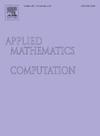致动器故障和脉冲欺骗攻击下退化跃迁系统的 H∞ 自适应 ETF 控制,应用于 DCMIP 设备
IF 3.5
2区 数学
Q1 MATHEMATICS, APPLIED
引用次数: 0
摘要
本文探讨了执行器故障和冲动欺骗攻击下退化跃迁系统的 H∞ 自适应事件触发反馈控制问题。在周期采样策略的基础上,提出了一种依赖于模式的自适应事件触发方案,该方案可以节省通信资源、避免芝诺现象并充分利用马尔可夫模式信息。通过构建包含片断线性脉冲辅助函数的新Lyapunov-Krasovskii(L-K)函数并应用奇异值分解(SVD)技术,在线性矩阵不等式(LMI)框架下得到了执行器故障和脉冲欺骗攻击下退化马尔可夫跃迁系统的新随机可接受性条件,并同时设计了带加权矩阵的自适应事件触发方案和反馈控制器。通过应用自由权矩阵方法和网络诱导延迟导数为一的特性,将非严格的线性矩阵不等式条件转化为严格的线性矩阵不等式条件,从而充分实现了退化跃迁系统的随机可接受性和状态反馈控制器增益。最后,利用直流电机控制的倒立摆(DCMIP)装置证实了所提出方法的可行性。本文章由计算机程序翻译,如有差异,请以英文原文为准。
H∞ adaptive ETF control for degenerate jump systems under actuator faults and impulsive deception attacks with application to DCMIP device
This article considers the issue of adaptive event-triggered feedback control for degenerate jump systems under actuator faults and impulsive deception attacks. Based on periodic sampling strategy, a mode-dependent adaptive event-triggered scheme is developed, which can save communication resources, avoid the Zeno phenomenon and take full advantage of Markovian mode information. By constructing the neoteric Lyapunov-Krasovskii (L-K) functional containing piecewise linear impulsive auxiliary functions and applying singular value decomposition (SVD) technique, the fresh stochastic admissibility conditions for degenerate Markovian jump systems under actuator faults and impulsive deception attacks are obtained under the framework of linear matrix inequalities (LMIs), and then the adaptive event-triggered scheme with weighted matrices and feedback controller are designed simultaneously. By applying freedom weight matrix method and the property that the network-induced delay derivative is one, the non-strict LMI conditions are transformed into strict ones, such that the stochastic admissibility of the degenerate jump systems and state feedback controller gains are realized adequately. Finally, a direct current motor-controlled inverted pendulum (DCMIP) device is used to confirm the feasibility of the presented approach.
求助全文
通过发布文献求助,成功后即可免费获取论文全文。
去求助
来源期刊
CiteScore
7.90
自引率
10.00%
发文量
755
审稿时长
36 days
期刊介绍:
Applied Mathematics and Computation addresses work at the interface between applied mathematics, numerical computation, and applications of systems – oriented ideas to the physical, biological, social, and behavioral sciences, and emphasizes papers of a computational nature focusing on new algorithms, their analysis and numerical results.
In addition to presenting research papers, Applied Mathematics and Computation publishes review articles and single–topics issues.

 求助内容:
求助内容: 应助结果提醒方式:
应助结果提醒方式:


